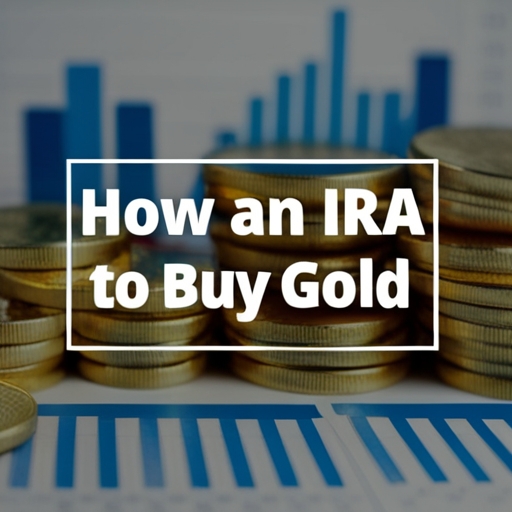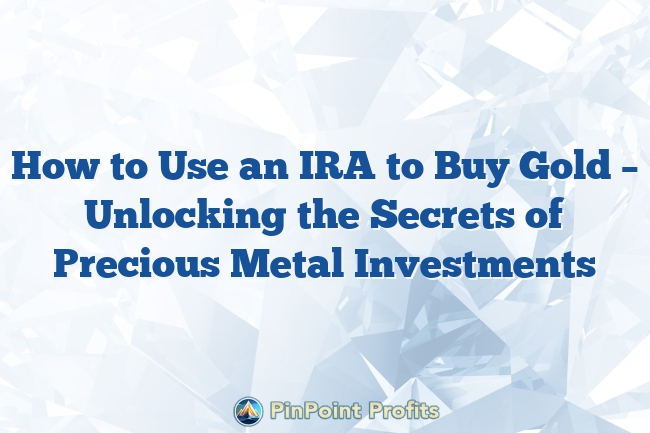If you're looking to add more gold to your IRA, then you're in the right spot. This guide will walk you through everything you need to know about investing in gold through your IRA. Let's dive into the specifics of a Gold IRA and how it can enhance your retirement portfolio.
What is a Gold IRA?
A Gold IRA is a type of self-directed IRA that allows you to invest in physical gold and other precious metals. Unlike traditional IRAs, which typically hold stocks and bonds, a Gold IRA holds IRS-approved gold, such as gold bullion and gold coins. This type of IRA provides a unique opportunity for portfolio diversification and acts as a hedge against inflation.
With a Gold IRA, you can invest in gold bars and gold-backed IRAs, offering a safe-haven asset for your retirement savings. The process involves working with an IRA custodian who specializes in precious metals IRAs. They help manage the account and ensure compliance with IRS regulations.
| Feature | Description |
|---|---|
| Investment Type | Physical Gold |
| Account Type | Self-directed IRA |
| Compliance | IRS Regulations |
| Storage | Precious Metals Depository |
Gold IRAs offer tax-deferred investment benefits, similar to traditional IRAs, allowing you to grow your wealth without immediate tax implications. This makes them an attractive option for those looking to preserve their assets and protect against economic uncertainties.

Benefits of Investing in Precious Metals
Investing in precious metals, such as gold, offers several benefits. One of the primary advantages is the ability to hedge against inflation. Gold has historically maintained its value over time, making it a reliable store of wealth. This makes it an excellent choice for those seeking inflation protection.
Another benefit is portfolio diversification. By adding gold to your retirement portfolio, you reduce the risk associated with traditional investments like stocks and bonds. Gold is considered a safe-haven asset, providing stability during economic downturns. This diversification can enhance your overall investment strategy and improve long-term returns.
Precious metals also offer asset preservation. Unlike paper assets, gold is a tangible asset that cannot be easily devalued. This makes it a secure investment option for those looking to safeguard their wealth. Additionally, gold's global demand ensures its liquidity, allowing you to easily convert it into cash when needed.
Steps to Buy Gold with an IRA
Buying gold with an IRA involves several steps. First, you need to open a self-directed IRA account with a qualified IRA custodian. This custodian will help you navigate the process and ensure compliance with IRS regulations. Once your account is set up, you can fund it through an IRA rollover or transfer.
Next, you'll need to select the type of gold you want to invest in. Options include gold bullion, gold coins, and gold bars. It's important to choose IRS-approved gold to ensure compliance. Your custodian will assist you in purchasing the gold and arranging for its storage in a precious metals depository.
Once your gold is purchased, it will be stored in a secure facility. This physical gold storage ensures the safety of your investment. Your custodian will provide custodial services, managing the account and handling any necessary paperwork. This process allows you to focus on your gold investment strategy and enjoy the benefits of a gold-backed IRA.
Eligibility Criteria
To invest in a Gold IRA, you must meet certain eligibility criteria. First, you need to have an existing IRA or 401(k) account. This allows you to perform an IRA rollover or transfer to fund your Gold IRA. It's important to note that IRA contribution limits apply, so be mindful of these when funding your account.
Additionally, you must work with an approved IRA custodian who specializes in precious metals IRAs. This ensures compliance with IRS regulations and provides the necessary custodial services. Your custodian will guide you through the process and help you select the appropriate gold investments.
Lastly, you must choose IRS-approved gold for your Gold IRA. This includes specific types of gold bullion, gold coins, and gold bars. Your custodian will provide a list of eligible options to ensure compliance. By meeting these criteria, you can successfully invest in a Gold IRA and enjoy the benefits of precious metal diversification.
Types of Gold Investments
When investing in a Gold IRA, you have several options for gold investments. One popular choice is gold bullion, which includes gold bars and gold coins. These tangible assets offer a reliable store of value and are easily tradable. Gold bullion is a common choice for those seeking a safe-haven asset.
Another option is gold mining stocks. These stocks represent shares in companies that mine and produce gold. While they offer potential for higher returns, they also come with increased risk. Gold mining stocks are considered an alternative investment and can complement a Gold IRA.
Gold ETFs (Exchange-Traded Funds) are another option. These funds track the price of gold and offer a convenient way to invest in the precious metal. Gold ETFs provide liquidity and can be easily bought and sold on the stock exchange. They offer a flexible investment option for those looking to diversify their retirement portfolio.
Risks and Considerations
Investing in a Gold IRA comes with certain risks and considerations. One risk is the fluctuating gold spot price. Gold prices can be volatile, and it's important to be aware of market trends. This volatility can impact the value of your investment and should be considered when developing your gold investment strategy.
Another consideration is the cost of physical gold storage. Storing gold in a precious metals depository incurs fees, which can affect your overall returns. It's important to factor these costs into your investment plan and choose a storage option that aligns with your budget.
Additionally, there are risks associated with choosing the right IRA custodian. It's crucial to work with a reputable custodian who specializes in precious metals IRAs. They will ensure compliance with IRS regulations and provide the necessary custodial services. By carefully considering these risks, you can make informed decisions and maximize the benefits of your Gold IRA.
Tax Implications
A Gold IRA offers several tax advantages. Like traditional IRAs, Gold IRAs provide tax-deferred investment benefits. This means you won't pay taxes on your investment gains until you withdraw funds during retirement. This allows your investment to grow without immediate tax implications.
However, it's important to be aware of the tax implications when withdrawing funds from your Gold IRA. Withdrawals are subject to income tax, and early withdrawals may incur additional penalties. It's crucial to plan your withdrawals carefully to minimize tax liabilities.
Additionally, Gold IRAs are subject to IRA contribution limits. These limits determine how much you can contribute to your account each year. It's important to stay within these limits to avoid penalties and ensure compliance with IRS regulations. By understanding the tax implications, you can make informed decisions and optimize your Gold IRA investment.
Choosing a Custodian
Choosing the right IRA custodian is crucial for a successful Gold IRA investment. A qualified custodian will provide the necessary custodial services and ensure compliance with IRS regulations. They will also assist you in selecting the appropriate gold investments and arranging for physical gold storage.
When selecting a custodian, consider their experience and reputation in the industry. Look for a custodian who specializes in precious metals IRAs and has a track record of success. They should offer comprehensive services, including account management and reporting.
Additionally, consider the fees associated with their services. Custodial fees can vary, so it's important to choose a custodian that aligns with your budget. By carefully selecting a custodian, you can ensure a smooth and successful Gold IRA investment.
Storage Options for Gold
When investing in a Gold IRA, it's important to consider your storage options. Physical gold storage is a key component of a Gold IRA, and it's crucial to choose a secure and reliable option. One common choice is a precious metals depository, which offers secure storage for your gold investments.
Depositories provide a safe and controlled environment for storing gold bullion, gold coins, and gold bars. They offer advanced security measures, including surveillance and insurance, to protect your investment. This ensures the safety of your gold and provides peace of mind.
Another option is to store your gold with your IRA custodian. Some custodians offer storage services as part of their custodial services. This can be a convenient option, as it simplifies the process and ensures compliance with IRS regulations. By choosing the right storage option, you can safeguard your gold investments and enjoy the benefits of a Gold IRA.
Costs Involved
Investing in a Gold IRA involves several costs. One of the primary costs is the purchase of gold. The price of gold can fluctuate, so it's important to be aware of the current gold spot price when making your investment. This will help you make informed decisions and optimize your investment strategy.
Another cost to consider is the fees associated with your IRA custodian. Custodians charge fees for their services, including account management and custodial services. These fees can vary, so it's important to choose a custodian that aligns with your budget.
Additionally, there are costs associated with physical gold storage. Storing your gold in a precious metals depository incurs fees, which can impact your overall returns. It's important to factor these costs into your investment plan and choose a storage option that aligns with your budget. By understanding the costs involved, you can make informed decisions and maximize the benefits of your Gold IRA.
Regulations and Compliance
Investing in a Gold IRA requires compliance with IRS regulations. These regulations dictate the types of gold that can be held in a Gold IRA, as well as the storage and reporting requirements. It's crucial to work with a qualified IRA custodian who specializes in precious metals IRAs to ensure compliance.
One key regulation is the requirement to hold IRS-approved gold. This includes specific types of gold bullion, gold coins, and gold bars. Your custodian will provide a list of eligible options to ensure compliance. Additionally, your gold must be stored in a secure facility, such as a precious metals depository.
Another important regulation is the reporting requirement. Your custodian will handle the necessary paperwork and reporting to ensure compliance with IRS regulations. This includes providing annual statements and tax forms. By understanding the regulations and working with a qualified custodian, you can ensure a successful Gold IRA investment.

Conclusion
Investing in a Gold IRA offers a unique opportunity to diversify your retirement portfolio and protect against economic uncertainties. By understanding the benefits, risks, and costs involved, you can make informed decisions and optimize your investment strategy. A Gold IRA provides tax-deferred investment benefits, allowing your wealth to grow without immediate tax implications. It's crucial to work with a qualified IRA custodian who specializes in precious metals IRAs to ensure compliance with IRS regulations. They will assist you in selecting the appropriate gold investments and arranging for secure storage. By carefully considering your options and planning your investment strategy, you can enjoy the benefits of a Gold IRA and safeguard your retirement savings.
Frequently Asked Questions
What types of gold can I invest in with a Gold IRA?
You can invest in IRS-approved gold, including gold bullion, gold coins, and gold bars. These tangible assets offer a reliable store of value and are easily tradable. Your IRA custodian will provide a list of eligible options to ensure compliance with IRS regulations.
How do I choose the right IRA custodian for my Gold IRA?
When choosing an IRA custodian, consider their experience and reputation in the industry. Look for a custodian who specializes in precious metals IRAs and offers comprehensive services, including account management and reporting. Additionally, consider the fees associated with their services to ensure they align with your budget.
What are the tax implications of a Gold IRA?
A Gold IRA offers tax-deferred investment benefits, similar to traditional IRAs. This means you won't pay taxes on your investment gains until you withdraw funds during retirement. However, withdrawals are subject to income tax, and early withdrawals may incur additional penalties. It's important to plan your withdrawals carefully to minimize tax liabilities.

